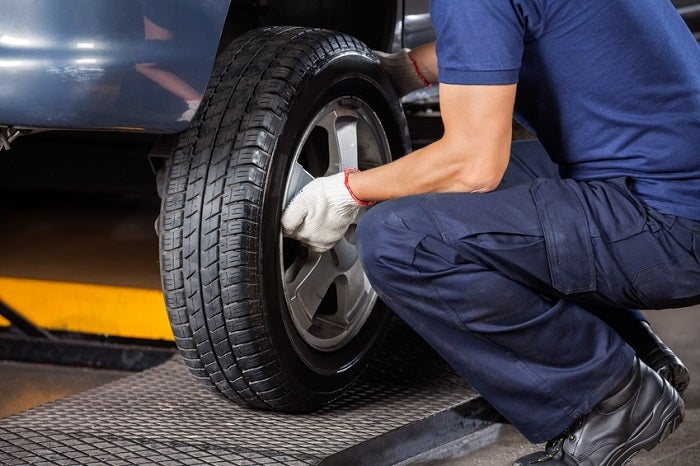Drive with Confidence: GMC Tires Service at Morris Tires
Drive with Confidence: GMC Tires Service at Morris Tires
Blog Article
Tire Service: The Impact of Climate Condition
When it comes to making certain optimum performance and security on the roadway, recognizing the influence of weather conditions on tire solution is critical. GMC Tire Service. In this discussion, we will discover the elaborate partnership in between weather problems and tire service, shedding light on the value of weather-specific tire upkeep techniques and factors to consider.
Warm and Tire Efficiency
When revealed to high temperatures, tires experience modifications in performance that can significantly impact car safety and security and handling. The warm created from long term driving or hot climate problems triggers the tire rubber to soften, causing reduced walk life and boosted wear. As the rubber becomes softer, the tire's grasp when driving lessens, influencing braking distances and overall traction. In extreme situations, excessive warmth can even trigger tire blowouts, posing a serious security risk to the vehicle and its owners.

Cold Weather Results
Winter conditions can have a substantial influence on tire performance and safety and security. As temperatures drop, tire rubber can harden, causing reduced grip on icy or snow-covered roadways. In winter, tires might also lose atmospheric pressure much more rapidly, which can influence managing and fuel effectiveness. Additionally, chilly temperature levels can cause tire sidewalls to tense, increasing the threat of damages from splits or various other roadway dangers.
To reduce the impacts of cool weather on tires, it is critical to regularly check tire stress and inflate them to the maker's recommended degrees. Utilizing winter or all-season tires made for winter conditions can also enhance grip and grasp on icy or snowy roadways. Correct tire maintenance, including regular evaluations for wear and damages, becomes much more crucial during colder months to ensure ideal efficiency and security.
Rainy Conditions Effect
Tires with damaged footsteps are much more vulnerable to hydroplaning, where a layer of water develops up between the road and the tire surface, leading to loss of grip. To combat this, chauffeurs should on a regular basis evaluate their tires for sufficient walk deepness and consider investing in tires especially made for damp conditions.
Moreover, rainy weather condition can also reduce visibility, making it testing for chauffeurs to see the road in advance plainly (GMC Tire Service). In such conditions, it is necessary to change driving speeds as necessary and preserve a secure complying with distance to enable unexpected quits. Appropriately inflated tires can likewise aid in maintaining control on wet roadways by giving better handling and grasp
Snow and Tire Safety
Snow-covered roadways posture distinct obstacles for chauffeurs, emphasizing the importance of proper tire choice and maintenance. When driving in snowy problems, having the right tires can make a significant distinction in safety and security and performance. Wintertime tires are created with special rubber compounds and step patterns to offer much better article grip on snow and ice compared to all-season tires. The much deeper footsteps and sipes of winter tires aid hold the road much better, reducing the risk of slipping and gliding.

It is essential to comply with manufacturer instructions when making use of and setting up tire chains to stop damage to the tires and automobile. By choosing the right tires, keeping correct inflation, and taking into consideration additional grip aids like tire chains, motorists can boost their security when navigating snow-covered roads.
Weather-Related Tire Maintenance
When confronted with different climate condition, appropriate tire upkeep comes to be a vital aspect of vehicle security and performance. Weather-related tire maintenance encompasses a series of techniques focused on making certain ideal tire function and durability in various weather condition circumstances. One site link essential facet of weather-related tire maintenance is tire stress law. Changing temperatures can cause tire stress to vary, affecting grip and gas efficiency. On a regular basis changing and checking tire pressure according to producer referrals is necessary for secure driving in changing weather. Furthermore, tire walk deepness plays a substantial function in taking care of various weather condition aspects. Tires with ample tread deepness offer far better hold on wet or icy roads, lowering the danger of skidding or hydroplaning. Evaluating tire walk routinely and replacing tires when tread wear gets to a particular deepness is crucial for maintaining traction and security in unfavorable climate. By focusing on weather-related tire maintenance, vehicle drivers can improve security, boost lorry efficiency, and extend the lifespan of their tires.
Conclusion
In verdict, weather conditions have a considerable effect on tire performance and security. From warmth impacting tire stress and put on to cold weather lowering grip, it is essential to think about the climate when keeping and using tires.
In this conversation, we will certainly explore the elaborate partnership between weather conditions and tire service, shedding light on the significance of weather-specific tire upkeep techniques and factors to consider.

Report this page